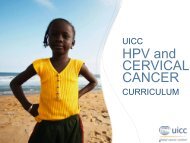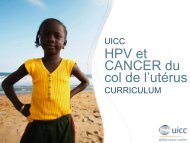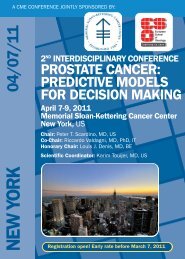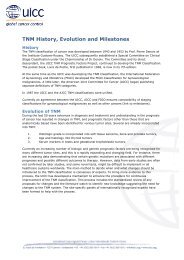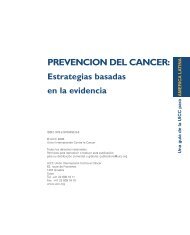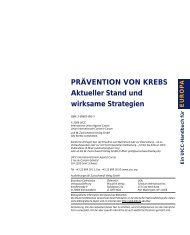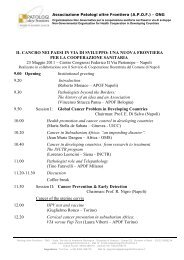Annual Report 05 - International Union Against Cancer
Annual Report 05 - International Union Against Cancer
Annual Report 05 - International Union Against Cancer
You also want an ePaper? Increase the reach of your titles
YUMPU automatically turns print PDFs into web optimized ePapers that Google loves.
Ida Prista Maryetty<br />
Member of the month, Nov-Dec 2008<br />
Harald zur Hausen wins Nobel prize<br />
monthly publication that provides a<br />
selection of scientific related news and<br />
current research. The alert is managed<br />
by Dr Paola Pisani, a cancer epidemiologist<br />
who has worked with the<br />
<strong>International</strong> Agency for Research on<br />
<strong>Cancer</strong> (IARC) and the University of<br />
Oxford and is now at the University<br />
of Turin, and edited by Dawn<br />
Antoline of John Wiley & Sons. It is<br />
distributed by email and is also available<br />
on the Community website.<br />
The member of the month was<br />
launched in March 2008 to begin<br />
personalizing the website. Members<br />
of the month are chosen based on<br />
their level of participation in the<br />
Community: a picture and a short<br />
biography are posted, along with a<br />
small interview focusing on what<br />
they enjoy most on the site.<br />
The Community played an<br />
important role in supporting UICC<br />
advocacy and communication:<br />
In October 2008, Prof Harald zur Hausen, editor-in-chief of the<br />
UICC’s <strong>International</strong> Journal of <strong>Cancer</strong>, was awarded a Nobel prize<br />
for his discovery of human papilloma viruses causing cervical cancer.<br />
In making the award, the Nobel Assembly said that Prof zur<br />
Hausen “went against current dogma and postulated that oncogenic<br />
human papilloma virus (HPV) caused cervical cancer, the second<br />
most common cancer among women. He realized that HPV DNA<br />
could exist in a non-productive state in the tumours, and should be<br />
detectable by specific searches for viral DNA He found HPV to be a<br />
heterogeneous family of viruses. Only some HPV types cause cancer.<br />
His discovery has led to characterization of the natural history of<br />
HPV infection, an understanding of mechanisms of HPV-induced<br />
carcinogenesis and the development of prophylactic vaccines against<br />
HPV acquisition…”<br />
“The global public health burden attributable to human papilloma<br />
viruses is considerable. More than 5% of all cancers worldwide are<br />
caused by persistent infection with this virus. Infection by the human<br />
papilloma virus is the most common sexually transmitted agent,<br />
afflicting 50-80% of the population. Of the more than 100 HPV<br />
types known, about 40 infect the genital tract, and 15 of these put<br />
women at high risk for cervical cancer…”<br />
“Harald zur Hausen demonstrated novel properties of HPV that<br />
have led to an understanding of mechanisms for papilloma virusinduced<br />
carcinogenesis and the predisposing factors for viral persistence<br />
and cellular transformation. He made HPV16 and 18 available<br />
to the scientific community. Vaccines were ultimately developed that<br />
provide ≥95 % protection from infection by the high risk HPV16 and<br />
18 types. The vaccines may also reduce the need for surgery and the<br />
global burden of cervical cancer.”<br />
The UICC congratulates Prof zur Hausen warmly on this distinction.<br />
Connecting, mobilizing, supporting<br />
• giving free access to the Community<br />
website to all participants during the<br />
World <strong>Cancer</strong> Congress<br />
• hosting the smoke-free symbol<br />
competition and the endorsement<br />
page of the World <strong>Cancer</strong><br />
Declaration<br />
• inviting members to exchange<br />
information about World <strong>Cancer</strong><br />
Day activities and to submit comments<br />
on the draft World <strong>Cancer</strong><br />
Declaration 2008<br />
• promoting the cervical cancer initiative<br />
and the World <strong>Cancer</strong><br />
Declaration (through Ask the<br />
Expert discussions), the Reel Lives<br />
film festival, and UICC-sponsored<br />
grant and funding opportunities<br />
Throughout the year, membership<br />
of the Community grew steadily.<br />
Currently it stands at 3,000.<br />
To join the Global <strong>Cancer</strong> Control<br />
Community, visit the Community<br />
website: www.uicc-community.org.<br />
19<br />
Platforms for communication



